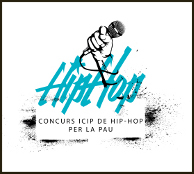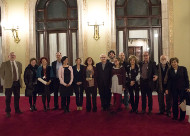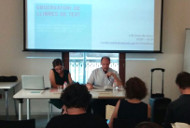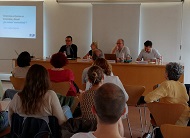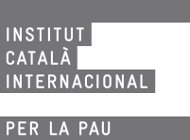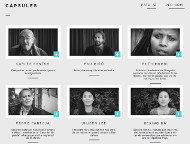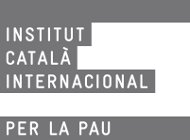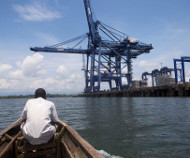The ICIP Governing Board approved the document “Work focus for the 2022 ICIP. Peacebuilding and the development of coexistence” which fixes the overall framework of action the institution will follow during the next four years. The document is based on numerous contributions, collected over the last months by various actors, from a wide range of degrees of reflection. Internal reflections at the heart of ICIP’s Governing Board and working team, and inquiries of an external nature with representatives of all parliamentary groups, private persons from the academic world, organisations from civil society and international institutions, such as SIPRI and the Flemish Peace Institute.
The work document fixes, as general action criteria, the creation of four main transversal programs, which need to include research; transfer of knowledge, training and public outreach; opinion forming; and support for concrete peace actions. These programs are:
– Program 1: Peacebuilding and the development of coexistence after violence has ended.
– Program 2: Violence outside armed conflicts.
– Program 3: Peace and security in public policies.
– Program 4: Companies, conflicts and human rights.
Based on the development of these programs, ICIP wants the different themes to be addressed from an implicit perspective of nonviolence and human safety, empowerment of victims, gender position and special attention for minorities and diversity. As such, ICIP’s actions will revolve around a concept of peacebuilding and the development of coexistence in a positive and prepositive way: a peace which is based on social justice, enforcement of human rights and preservation of individual and collective liberties, and which addresses direct violence as well as structural and cultural violence.
Author: whads
ICIP condemns the violence, used on 1st October
ICIP (International Catalan Institute for Peace) firmly condemns the violence, used on 1st October in Catalonia by the security forces of the state and pleads once again for a pacific, democratic and negotiated solution for the political conflict we are facing.
To demonstrate their rejection of violence, ICIP will join the protest marches, organised next Monday 2nd October at 12.00, outside of the work places, as well as all demonstrations in the defence of every individual’s personal rights.
As such, in view of the violation of basic rights and the denial of the Catalan population’s right to decide, we repeat our urgent call for dialogue and the need for international mediation to allow Catalonia to freely exercise its right to decide, expressed massively in the ballot boxes.
ICIP announces the 2nd edition of its Hip-hop for Peace Contest
ICIP has publicly announced the second edition of its Hip-hop for Peace Contest, once again with the objective of giving more visibility to the commitment and creativity of young people in the context of the culture of peace. As stated in the regulations and the announcement, the contest contains two categories. In the first one, students of the Catalan compulsory secondary education, vocational education or high school level can sign up; in the second category, boys and girls between 12 and 25 years, linked to youth, cultural, civic or socio-educational centres and organisations can register. In both cases, to sign up for the contest, a group needs to consist of minimum three people.
In order to participate, it is necessary to compose a hip-hop piece with original lyrics and record a video of its performance, with a maximum duration of 4 minutes. The text of the songs needs to be linked with the celebration of differences; coexistence in urban or school environments; criticism on violence; denouncing human rights violations; solidarity with people, trapped in or running away from armed conflicts; or the role of young people in peacebuilding.
Registration is open until 30th January 2018, which falls together with the School Day for Nonviolence and Peace (DENIP, Dia Escolar de la Noviolència i la Pau). People interested in participating can complete the following form and deliver the documentation and work presented to the ICIP offices (carrer Tapineria 10, 08002, Barcelona).
The prizes consist of a master class, given by a professional hip-hop artist, as well as the recording of the winning piece in a professional studio. In the first edition of the contest (watch the summary video), where 24 works were presented, the master class was given by the workshop facilitator and activist Pau Llonch, while the recording of one of the winning clips was done in the Conga Music studio in Sabadell.
In this new edition, the contest also counts with the support of the Department of Education and the Directorate General for Youth Affairs of the Generalitat of Catalonia.
ICIP confers Peace in Progress Award on Peace Brigades International
The International Catalan Institute for Peace (ICIP) presented the 2016 Peace in Progress Award to the NGO Peace Brigades International (PBI) for their work in the support and accompaniment of human rights defenders. The event took place in the Parliament of Catalonia on Tuesday 7 February and was attended by approximately one hundred people.
The ceremony was chaired by the President of Parliament, Carme Forcadell, and ICIP president Xavier Masllorens. On the part of the award-winning organization, the representative of PBI Spain, Montserrat García, picked up the award, while the commentary was given by the historic human rights activist and current Member of Congress in Guatemala, Nineth Montenegro.
ICIP president Xavier Masllorens justified recognition for PBI because “standing by those whose most fundamental rights are violated, and who risk their lives and safety, accompanying them, is at the very heart of the ethic of care that we promote from the institutions that work for peace.”
The importance of the work carried out by Peace Brigades International was made clear with the emotional testimony of human rights activist Nineth Montenegro, founder of the Mutual Support Group (GAM), an organization formed by relatives of the disappeared in Guatemala, who was supported and protected by PBI in the 1980s after she denounced the abduction and disappearance of her husband: “Neither my daughter nor I would be alive if it were not for the commendable, selfless and self-sacrificing work of members of the Brigades. […] They gave me the opportunity to stand up today in Guatemala and keep fighting for a better country.”
During the ceremony a video about Peace Brigades International was shown, and then Professor Antoni Pigrau, member of the ICIP Governing Board, read the conferment statement. The award was presented to the international representative of PBI Spain, Montserrat García, who dedicated it to all human rights defenders, “with the hope that it will contribute to make the important work they do more visible, and for which they face threats, attacks and persecution.” In her speech, García regretted that “unfortunately, the world remains a dangerous place to defend human rights and the need for international support is growing.” The international representative of PBI also highlighted “the hundreds of volunteers” who have been members of PBI teams and who are one of the “fundamental pillars” of the organization.
In the closing ceremony, the President of Parliament, Carme Forcadell, congratulated the International Brigades and stated that they were a “necessary model” because “we need to have examples that reinforce the culture of peace in our society.” Forcadell said that “peace is much more than the absence of violence,” because “there can be no peace without respect for human rights and dignity. There is no peace without freedom and justice.”
Inspired by Gandhi’s nonviolent techniques, Peace Brigades International was founded in 1981 with the conviction that the presence of international volunteers could deter attacks against the civilian population in conflict areas. Thus, for 35 years, they have been working in conflict areas, where their volunteers provide support to human rights activists and other groups and organizations that are threatened, such as unions or indigenous communities. They currently have permanent teams in Guatemala, Colombia, Mexico, Honduras, Nepal, Indonesia and Kenya, and they have also worked in Sri Lanka, the Balkans, El Salvador, Haiti and East Timor.
The ICIP Peace in Progress Award is granted annually and consists of public recognition, a sculpture created by Nobel Peace Prize winner, activist and artist Adolfo Pérez Esquivel, called Porta del Sol, and a financial prize of 4,000 euros.
Full video of the ceremony (Canal Parlament)
Social Sciences Textbooks Are Lacking in Education for Peace
A study carried out by ICIP and the UAB School for a Culture of Peace on the values transmitted in social sciences textbooks used in the third year of Compulsory Secondary Education (ESO) has found that they do not adhere to peace education criteria.
The report, the result of work carried out in 2016 by a multidisciplinary research team, analyzes the contents of seven books by Catalan publishers on the basis of six perspectives: peace and conflict; socioeconomic development; gender; intercultural diversity; the environment; and human rights and democracy. A seventh area deals with the methodologies of learning exercises.
The document states that the textbooks have a very explicit discourse in accordance with the values of peace education. However, in the implicit discourse, several shortcomings and imbalances have been observed in each perspective. According to the findings of the study, 93 percent of the individuals mentioned are men –mostly Europeans– and there are almost no women or representatives of other cultures. As for social classes, disadvantaged groups are clearly underrepresented and, although poverty is discussed in depth, it is presented as a phenomenon of developing countries, with no analysis of the inequalities present in developed countries.
One of the strengths of the textbooks, and the issue that is dealt with the most, is their crosscutting perspective on the environment. On the other hand, gender and diversity are the most neglected issues. Extremely pronounced biases have been observed regarding gender (men: 92.9 percent; women: 7.1 percent) and the countries of origin of these people (European: 95.4 percent; from other continents: 4.6 percent).
According to the study’s conclusions, the main challenges to improve peace education in textbooks are reinforcing the mainstreaming of the perspectives and avoiding the overrepresentation of certain narratives. To this end, it is recommended to introduce more examples of episodes of peace and nonviolent actions –not just wars–; reflect the human consequences of violent episodes; and reflect on various economic models and possible alternatives.
Given the limitation of space available in textbooks and of instruction time in the classroom, the report does not seek to add additional content but rather to incorporate different crosscutting perspectives to explain each topic. The study shows that it is possible to educate in values while providing sufficient elements for students to learn to deliberate and develop critical thinking.
Understanding Violence is Key to Transforming It
As part of the process of reflection and thematic focus initiated by ICIP’s Governing Board, the seminar Violence(s) in Latin America: Causes, Consequences and Opportunities for Peacebuilding took place on Tuesday 30 May at the Can Sisteré Center for Contemporary Art in Santa Coloma de Gramenet.
The seminar focused on analyzing the nature, causes and consequences of the multiple types of structural violence particularly affecting Latin America beyond the dynamics of armed conflicts. This violence is widespread in countries like Brazil, Colombia, El Salvador, Guatemala, Mexico and Honduras (74 percent of the people who die violent deaths do so in a context of unarmed conflict). These types of violence have scarcely been analyzed with the theory of conflict analysis and peacebuilding and respond to complex rationales: contexts of institutional weakness with high levels of inequality, social exclusion and vulnerability.
In the inaugural conference, economist Luis Jorge Garay contextualized the phenomenon of these unconventional types of violence: new forms of criminality that exist in multiple dimensions (economic, political and social), in multiple locations (they are both a national and transnational phenomenon) and that are structural in nature because they are deeply rooted in both public and private institutions. Juan Carlos Garzón, a researcher at the Fundación Ideas para la Paz (Ideas for Peace Foundation), agreed with this main idea and added that in Latin America it is often the criminal organizations that guide the behavior of the State.
In his presentation, Garzón noted the high levels of violence that exist in Latin America, mainly in the cities (with 8 percent of the world’s population, the region accounts for 33 percent of the world’s homicides). For his part, Stephan Sakalian, of the International Committee of the Red Cross, highlighted the “invisible effects” of violence, beyond the homicides: internal displacement, threats, extortions, sexual violence, impact on mental health and disappearances.
In a roundtable discussion, the seminar also analyzed policy responses in countries like Honduras, Guatemala and El Salvador, revealing that hardline policies and securitization contribute to increased violence rather than to its transformation. In this regard, for example, researcher Sergio Maydeu noted that securitization has significant economic and social impacts, and that a comprehensive response to these types of violence is necessary, based on integration policies and economic opportunities for the population. Regarding the specific case of El Salvador, journalist Roberto Valencia described a harsh reality marked by the criminality of the “maras”, or gangs, which in his view are the main generators of violence. The seminar also discussed the war on drugs and the role of youth gangs, and ended with a panel discussion on peacebuilding and resilience strategies, with the work carried out by the activist Valdènia Paulino in poor and violent communities in Sao Paulo, and the project on reconciliation in El Salvador led by the professor and Marist Jaime Comabella.
In the concluding remarks, the professor and member of ICIP’s Governing Board, Oscar Mateos, emphasized the importance of understanding these other types of violence in order to transform them and thus open up new areas of study and research of this phenomenon to build new methodologies based on the experiences of peacebuilding that exist at a local level. Finally, he also put on the table the need for a greater involvement of international actors to give the situation more visibility.
Vídeos of the seminar
ICIP expresses concern about the presence of the Army at the Education Fair
ICIP president Xavier Masllorens has sent a letter to Fira de Barcelona to express his concern and disagreement with the decision taken by the Executive Council of the trade fair organization to maintain and expand the exhibition space for the Army at the Education Fair, which will take place from 22-26 March in Barcelona.
The letter highlights that the decision contradicts the criteria regarding demilitarization of the Barcelona City Council and the Parliament of Catalonia, which are also members of the highest governing body of Fira de Barcelona. Xavier Masllorens regretted that the offer of dialogue by the platform Demilitaritzem l’Educació (Let’s Demilitarize Education) wasn’t taken into account either. This platform consists of roughly seventy different organizations, such as the UNESCO Center of Catalonia, the Barcelona Youth Council and student unions.
The ICIP president invited Fira de Barcelona “to reflect on the meaning and principles that should govern the Education Fair,” one of the most important events in the field of education in Catalonia, and “to reconsider the decision” to allow a military presence at the fair.
Discussion on Reconciliation in the Basque Country
ICIP, in collaboration with Clack Video Productions, has organized the second dialogue in the series The Basque Country: Five Years Without ETA Violence. The event will take place at the Association of Journalists of Catalonia on Tuesday 15 November. Entitled Reconciliation, this second dialogue features journalist and writer Sabino Ormazabal, and the Bishop Emeritus of San Sebastián, Juan María Uriarte.
Chaired by the lawyer and ICIP Governing Board member Magda Oranich, the dialogue addressed the state of reconciliation between the opposing parties in the Basque Country in a situation without violence. The two speakers, albeit with different views on the theoretical concept of reconciliation, noted progress in Basque society but also the need to continue working, especially in schools and with young people. “There are people who do not know who Miguel Ángel Blanco was [PP councilor kidnapped and assassinated by ETA in 1997] and here there is a lot of work to do for future generations,” stated Sabino Ormazabal. In this respect, Bishop Juan María Uriarte also noted that there is a lot of “indifference” among young people regarding the ongoing peace process in the Basque Country.
In the dialogue, focusing especially on reconciliation at a social level, rather than at a personal level, it was pointed out that the reconciliation process is not closed, that it will be a slow process and that there is no going back: “The Abertzale Left is interested in affirming that the Basque Country is reconciled. ETA and the Abertzale Left have many accounts to settle, and to heal and pacify the country these accounts cannot be ignored,” said Uriarte. And he added: “In the Basque Country people want to forgive, but there are groups of people that do not want to or cannot do so.” Uriarte also pointed out that memory is an integral element of genuine reconciliation: “To forgive is not to forget, but to remember differently, without resentment.” Ormazabal, for his part, related reconciliation with “positive peace” and a commitment to deal with conflicts without violence. A point that Bishop Uriarte clarifies, however: “Peaceful coexistence as nonviolent coexistence, without arms, does not satisfy me; it is not true reconciliation. Reconciliation repairs the past and reveals the truth.”
During the session, the speakers also brought up the lack of political will to modify prison policy or the law of victims, and to address outstanding issues such as historical memory.
The next dialogue in this series, The Construction of Historical Memory, will take place on Tuesday 22 November at 6:30 pm, with the journalists Martxelo Otamendi, of the newspaper Berria, and Gorka Landaburu, of Cambio16.
New Peace Capsules to commemorate DENIP
Every year, on January 30, ICIP commemorates the School Day of Nonviolence and Peace (known by its Catalan acronym, DENIP), and this year it is releasing twelve new Peace Capsules to mark the occasion. These are twelve reflections on what peace is, recorded on video and published on the website www.capsulesdepau.com, which was created by ICIP and the journalist group Contrast in collaboration with Digital Dosis. The twelve new capsules feature activists and researchers from South Korea, Bahrain, South Africa, Kenya and Mexico, as well as the reflections of the composer and actor Carles Santos and actor Pau Miró.
The Peace Capsules project originated in September 2014 with the aim of presenting the diversity of visions and expectations projected onto the word Peace. People from around the world respond to the question What is peace to you? in relation to their experience in countries in conflict or to their commitment against war and with peacebuilding.
With the publication of the new capsules, the project now has a total of 76 videos subtitled in Catalan, Spanish and English. Those who have participated in the project and explain their vision of peace include peace researchers, activists and people who have experienced conflict firsthand.
Teaching materials
As a complement to the capsules, the website also contains various educational proposals which aim to promote personal skills that facilitate the analysis of violence and opportunities for peace, as well as the practice of creative conflict transformation, as part of a commitment to the promotion of a positive peace. These learning materials are designed for both formal and non-formal settings to facilitate a more comprehensive approach in the efforts to include peace culture in education plans.
ICIP participating in a project about the memory of Colombian women in the diaspora
ICIP is collaborating on the project “Commission of Truth, Memory and Reconciliation of Colombian Women Abroad,” promoted by the organization Conciliation Resources, with the aim of empowering women in the Colombian diaspora in order for them to play an active role in the social and political transformation of the Colombian peace process and in host countries. The project also aims to document the impact of war and migration on women and to identify the mechanisms used to overcome these experiences.
The study, coordinated by Helga Flamtermesky, was conducted from a feminist and psychosocial approach with 200 women living in various Catalan towns to identify the subjective truth of each participant from her identity as a Colombian and migrant. The profile of participants is broad, since the project wanted to involve women who have been affected by all the forms of armed conflict in Colombia since 1965. For this reason it includes both direct and indirect victims of the conflict, as well as returnees to Colombia and immigrants. At the same time, three more teams are working with 450 women in London, Stockholm and Bogotá to collect their testimonies.
The project was presented at the Colombian Consulate in Barcelona on April 22.
ICIP participating in the Catalan delegation to Buenaventura
Representatives of Catalan civil society organizations and institutions, including ICIP director Tica Font, visited the Colombian city of Buenaventura from April 27 to May 2. The aim of the trip was to carry out on-site monitoring of the conduct of the company TCB-Terminal de Contenidors de Barcelona through its subsidiary in Colombia. The delegation’s trip has been organized to coincide with the announcement of a public hearing before the Colombian Senate, entitled “Victims of development and an unconstitutional state of affairs,” which will explore the situation of the city, immersed in a serious humanitarian and human rights crisis.
The Catalan Coordination Group for Peace and Human Rights in Colombia (“Taula Catalana per la Pau i els Drets Humans a Colòmbia”) and Lafede.cat have been investigating complaints made by Colombian organizations against Grup TCB. In June 2015 they brought a Colombian delegation to Catalonia to explain to Parliament the data and allegations contained in the report “Communities under siege: the impact of a Catalan company, Grup TCB, in Buenaventura, Colombia.” This report details the situations of violence generated by the economic and urban development plans in the Colombian city, in which Catalan companies are directly or indirectly involved. All the parliamentary groups expressed their commitment to monitor the situation. In addition to the ICIP director, the Catalan delegation also included the president, vice president and coordinator of “Taula Catalana per la Pau i els Drets Humans a Colòmbia”, Michela Albarello, Tono Albareda and Amaia García, respectively; Julián Artacho, representative in Colombia of the Catalan Agency for Development Cooperation; Gabriela Serra, Member of Parliament for the CUP; Joan Maria Soler, vice president of the Federation of Neighborhood Associations of Barcelona, and Josep Maria Fisa, representative of the Archbishop of Barcelona and of “Justícia i Pau”.
Kick-Off Meeting of Diaphora European Project
Last Friday 15th of January Kick-Off Meeting of Diaphora project took place and ICIP participated. Diaphora is a European research and training platform for collaborative research on the nature of philosophical problems, their resilience and the sources of persistent divergence of expert opinion about them, and their relation to conflicts in the practical sphere. ICIP collaborates in the practical training of some of the researchers that will take part in the project, more concretely, October 2016 onwards, three of them will spend a few weeks at ICIP so that their training and research will be complemented.
The universities and research centres that are in the project are from Barcelona, Munich, Neuchâtel, Stirling, Stockholm, Edinburgh and the, École Normale Supérieure of Paris;
The call for researchers that wish to take part in the project is open until February 8th.



